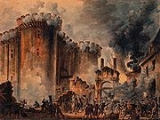
French Revolution
The French Revolution , sometimes distinguished as the 'Great French Revolution' , was a period of radical social and political upheaval in France and Europe. The absolute monarchy that had ruled France for centuries collapsed in three years...
Timeline of Events
|
987
|
|
||||||||
|
1786
|
|
||||||||
|
1789
|
|
||||||||
|
1790
|
|
||||||||
|
1791
|
|
||||||||
|
1792
|
|
||||||||
|
1793
|
|
||||||||
|
1794
|
|
||||||||
|
1802
|
|

